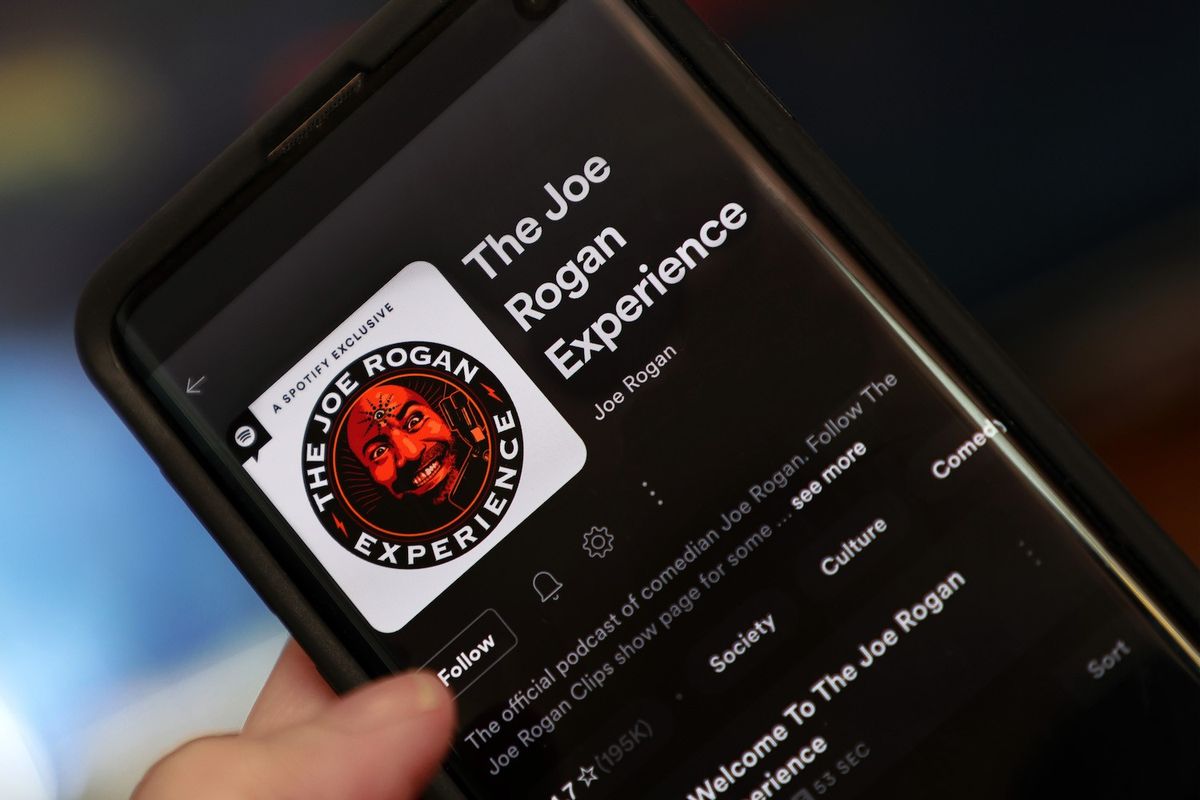
Spotify Hosts The Joe Rogan Experience Podcast
Photo Illustration by Cindy Ord via Getty Images.
To continue reading
Create a free account or sign in to unlock more free articles.
By continuing, you agree to the Terms of Service and acknowledge our Privacy Policy
Register
The content is free, but you must be subscribed to Okayplayer to continue reading.
THANK YOU FOR SUBSCRIBING
Join our newsletter family to stay tapped into the latest in Hip Hop culture!
Login
To continue reading login to your account.
Forgot your password?
Please enter the email address you use for your account so we can send you a link to reset your password:

Last week, Neil Young commenced the war on Spotify and Joe Rogan's misinformation machine by forcing the company to choose between hosting his catalog and providing a mostly unmoderated platform for the podcasting star to explore controversial and outright dangerous falsehoods regarding COVID-19 and the global effort to vaccinate the public against a deadly virus.
The streamer very predictably chose to back its nine-figure investment in the podcasting space over Young's music and swiftly began removing the folk-rock legend's songs from their servers. And in the days following, thousands of users staged a boycott of Spotify, scrapping their premium accounts in protest of the company's decision to roll with Rogan, who's recent guests include vaccine-developer-turned-skeptic, Dr. Robert Malone, mouth-of-the-modern-men's-rights-movement, Jordan Peterson, and COVID-conspiracy-specialist Peter McCullough. The fallout from Spotify's week of reckoning has reportedly cost the company billions in market value. But as other artists begin to flank Young's position on the streamer's irresponsible misinformation protocol, figuring out precisely which musicians are pulling their catalogs from the platform has uncovered a troubling and ironic cycle of unverified claims.
If you were amongst those attempting to follow the dominos on Twitter last week, that roster of protesting artists expanded in a hurry and receded even quicker. By the close of the weekend, depending on what you chose to read, that list could have included any number of grailed and greyed rockers from the last 50 years of recorded music. According to one Twitter user, the artists taking Young's lead included Joni Mitchell, Queen, Foo Fighters, Fleetwood Mac, The Who, and potentially, Radiohead. Another widely circulated tweet from the weekend (and from the same account,) added Paul McCartney, Bruce Springsteen, Barbara Streisand, The Rolling Stones, and Pearl Jam, to the list.
\u201c#Spotify boycott is on fire \ud83d\udd25 artists leaving so far:\n\nNeil Young\nJoni Mitchell\nFoo Fighters\nThe Who\nQueen\nFleetwood Mac\nRadiohead (rumored)\n\nThe list is growing...\u201d— Goth Brooks (@Goth Brooks) 1643491880
However, of the myriad musicians mentioned, only Mitchell's catalog has been confirmed as removed from Spotify in protest of the company. The rest were speculatively placed on the list based on statements from artists voicing their support for Young's action, but fell short of actually committing to pull their music. Springsteen appears to be named here as a result of E Street guitarist, Nils Lofgren, having stood with Young by requesting his music be removed from the platform. The Foo Fighters appear to have been included based on a viral video of Dave Grohl performing "Copacabana" by Barry Manilow, who, at one point, was rumored to be removing his music from Spotify as an act of solidarity with Young, but that too proved to be nothing more than conjecture, as the singer very explicitly proved he wanted none of the smoke.
How or why these lists came together is still unclear and mostly irrelevant. But it is both strange and concerning that we seem to have entered an endless feedback loop of poorly, if at all, vetted claims. Especially when that was the whole point of this protest. Identifying which artists are standing with Young against Spotify allowing misinformation to spread freely on their platform shouldn't lead to more misinformation spreading freely, but on a different platform. If anything, we've reached a point in this cycle where we should be able to take a step back and evaluate our role in such a flawed system. Outside of the new focus on what checks Spotify has in place for distributing false information, the lone upside to this controversy is that the company has been pressured into finally disclosing its criteria for what is considered to be dangerous, or at least damaging, misinformation. And if our criticism of Spotify is to have any legitimacy, we just might have to hold ourselves to a higher standard.